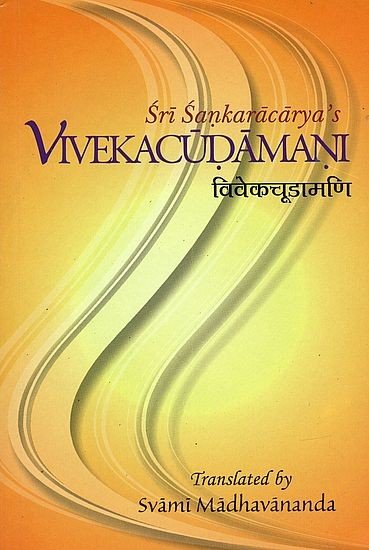Vivekachudamani
by Shankara | 1921 | 49,785 words | ISBN-13: 9788175051065
The Vivekachudamani is a collection of poetical couplets authored by Shankara around the eighth century. The philosophical school this compilation attempts to expose is called ‘Advaita Vedanta’, or non-dualism, one of the classical orthodox philosophies of Hinduism. The book teaches Viveka: discrimination between the real and the unreal. Shankara d...
Verse 213-214
श्रीगुरुरुवाच
सत्यमुक्तं त्वया विदन्निपुणोऽसि विचारणे ।
अहमादिविकारास्ते तदभावोऽयमप्यनु ॥ २१३ ॥सर्वे येनानुभूयन्ते यः स्वयं नानुभूयते ।
तमात्मानं वेदितारं विद्दि बुद्ध्या सुसूक्ष्मया ॥ २१४ ॥śrīgururuvāca
satyamuktaṃ tvayā vidannipuṇo'si vicāraṇe |
ahamādivikārāste tadabhāvo'yamapyanu || 213 ||sarve yenānubhūyante yaḥ svayaṃ nānubhūyate |
tamātmānaṃ veditāraṃ viddi buddhyā susūkṣmayā || 214 ||213-214. The Guru answered: Thou has rightly said, O learned man ! Thou art clever indeed in discrimination. That by which all those modifications such as egoism as well as their subsequent absence (during deep sleep) are perceived, but which Itself is not perceived, know thou that Ātman – the Knower – through the sharpest intellect.
Notes:
[The argument is this: The Atman as the eternal Subject must remain always. Otherwise there being no Subject, knowledge itself will be impossible. Even in the Sushupti state there must be the eternal Subject behind to record the blissful memory of that state. To take a familiar example: In a bioscope there must be the screen to allow the moving pictures to coalesce and form a connected whole. Motion presupposes rest. So the ever-changing Prakriti must have behind it the immutable Atman.
Through the sharpest intellect—An echo of Katha Upanishad I. iii. 12. ] *?*in«i*3»i?Tní írrr^rá siptjs^ ir^xii
